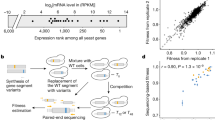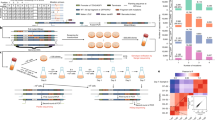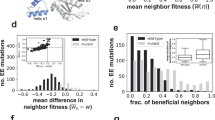Abstract
Whether more dispensable genes evolve faster than less dispensable ones1 is a contentious issue2,3,4. Comparing yeast and worm genes, Hirsh and Fraser3 observe a gradual tendency for less dispensable genes (those that reduce the growth rate of yeast when knocked out) to have lower rates of protein evolution. Here we repeat their analysis using larger data sets and find no evidence that dispensability explains the variation in rates of protein evolution. Although Hirsh and Fraser provide a model to show why their result is to be expected, our analysis suggests that their model, which assumes among other things that no substitution is advantageous, cannot be generally applied.
This is a preview of subscription content, access via your institution
Access options
Subscribe to this journal
Receive 51 print issues and online access
$199.00 per year
only $3.90 per issue
Buy this article
- Purchase on Springer Link
- Instant access to full article PDF
Prices may be subject to local taxes which are calculated during checkout

Similar content being viewed by others
References
Wilson, A. C., Carlson, S. S. & White, T. J. Annu. Rev. Biochem. 46, 573–639 (1977).
Hurst, L. D. & Smith, N. G. C. Curr. Biol. 9, 747–750 (1999).
Hirsh, A. E. & Fraser, H. B. Nature 411, 1046–1049 (2001).
Jordan, I. K., Rogozin, I. B., Wolf, Y. I. & Koonin, E. V. Genome Res. 12, 962–968 (2002).
Steinmetz, L. M. et al. Nature Genet. 31, 400–404 (2002).
Pál, C., Papp, B. & Hurst, L. D. Mol. Biol. Evol. 18, 2323–2326 (2001).
Yang, Z. Comput. Appl. Biosci. 13, 555–556 (1997).
Holstege, F. C. et al. Cell 95, 717–728 (1998).
Coghlan, A. & Wolfe, K. H. Yeast 16, 1131–1145 (2000).
Fraser, H. B., Hirsh, A. E., Steinmetz, L. M., Scharfe, C. & Feldman, M. W. Science 296, 750–752 (2002).
Pál, C., Papp, B. & Hurst, L. D. Genetics 158, 927–931 (2001).
Gibbons, J. D. Nonparametric Measures of Association (ed. Lewis-Beck, M. S.) (Sage, Newbury Park, UK, 1993).
Author information
Authors and Affiliations
Corresponding author
Ethics declarations
Competing interests
The authors declare no competing financial interests.
Rights and permissions
About this article
Cite this article
Pál, C., Papp, B. & Hurst, L. Rate of evolution and gene dispensability. Nature 421, 496–497 (2003). https://doi.org/10.1038/421496b
Issue Date:
DOI: https://doi.org/10.1038/421496b
This article is cited by
-
Systematic analysis reveals the prevalence and principles of bypassable gene essentiality
Nature Communications (2019)
-
Sensitivity and correlation of hypervariable regions in 16S rRNA genes in phylogenetic analysis
BMC Bioinformatics (2016)
-
Determinants of the rate of protein sequence evolution
Nature Reviews Genetics (2015)
-
Transcriptional abundance is not the single force driving the evolution of bacterial proteins
BMC Evolutionary Biology (2013)
-
Expression level, cellular compartment and metabolic network position all influence the average selective constraint on mammalian enzymes
BMC Evolutionary Biology (2011)
Comments
By submitting a comment you agree to abide by our Terms and Community Guidelines. If you find something abusive or that does not comply with our terms or guidelines please flag it as inappropriate.



